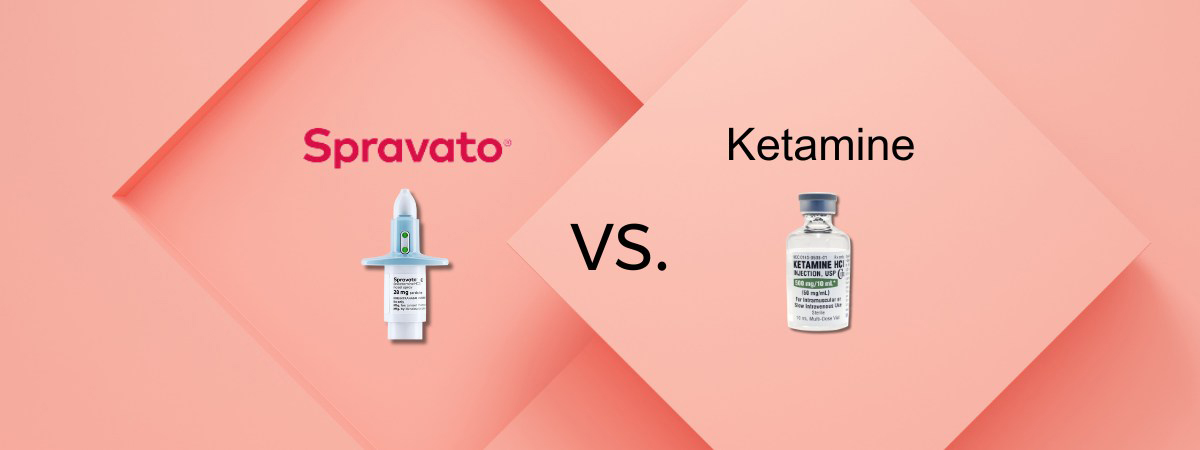
What's The Difference Between Spravato And Ketamine?
You might have heard of SPRAVATO, the first breakthrough depression drug in over 20 years. Made specifically for Treatment-Resistant Depression (TRD), Spravato acts on specific neural pathways to boost mood regulation. Spravato is the trade name for esketamine, often mixed up with the anesthetic ketamine. The two medications are similar, yet there are several major differences between Spravato and ketamine.
What is Spravato (esketamine)?
Spravato is a trailblazing new medicine that works differently than conventional antidepressants. The medication is taken through a self-administered nasal spray and helps the brain deliver messages more effectually. By stimulating particular receptors, you can govern mood better and decrease negative depression symptoms. The influence on mood can be immediate, especially for individuals suffering from Treatment-Resistant Depression.
The active ingredient in Spravato is esketamine, a ketamine derivative. Although Spravato and ketamine are similar from a chemical standpoint, they affect the body in different ways. Ketamine is used as an anesthetic, while esketamine stimulates particular neural receptors to improve brain plasticity. Because there is a chance of experiencing side effects like sedation, Spravato must be given under the supervision of an approved healthcare provider, like The Counseling Center in Philadelphia.
Esketamine is known for its quick impact, with results often observed as soon as 1-2 days following the opening dose. Clinical studies demonstrate that the benefits of treatment are realized at the conclusion of the 4-week induction period. Patients using Spravato have enjoyed:
• Mood regulation
• Elevated productivity
• More interest in socialization
Spravato does not replace your current antidepressant medication but is prescribed along with your antidepressant.
What Is Ketamine?
Ketamine is a substance usually used as a limited-duration anesthetic and given intravenously. The FDA has not approved ketamine as a depression medication. Ketamine also makes the news as a "club drug" that has increased in popularity among teenagers and young adults. Ingested as a liquid or powder, ketamine can generate feelings of euphoria and dissociation from reality. To lean more about ketamine addiction, please call us at 856-600-0951.
What Is The Difference Between Spravato and Ketamine?
Common Questions Concerning Spravato vs. Ketamine
Will Spravato nasal spray reduce pain like ketamine?
Spravato is not approved to treat pain, and pain reduction is not one of the drug's side effects. Ketamine is utilized as a surgical and veterinary anesthetic.
Can I use Spravato without supervision?
Currently, Spravato is only obtainable through authorized healthcare specialists because of sedation and dissociation side effects and the potential for abuse and misuse.
What is Treatment-Resistant Depression (TRD)?
Spravato is only approved for people with Treatment-Resistant Depression. You might have TRD if:
- You've received treatment for a severe depressive disorder
- You’ve tried a minimum of two antidepressant treatments
- You haven’t responded to treatment
Millions of individuals globally are treated for a major depressive disorder, and approximately 30% of those struggle daily with TRD.
What is Spravato treatment like?
First, if you are interested in Spravato, you need a clinical assessment to see if the medication is a good fit. During each session, you'll have your vital signs taken and administer the nasal spray yourself. Each Spravato appointment can take as long as two hours so healthcare providers can monitor for side effects. A quick appraisal is performed at the end of each session to record your progress. Due to safety matters, the drug will only be available via a REMS-certified Spravato Treatment Center like The Counseling Center in Philadelphia. It is also encouraged that you attend therapy regularly when using Spravato.
Would You Like More Information About Spravato?
Contact the Counseling Center to see if Spravato is right for you. Talk with a trained professional by calling 856-600-0951 or filling out the following form. We're ready for you 24/7, seven days a week.

